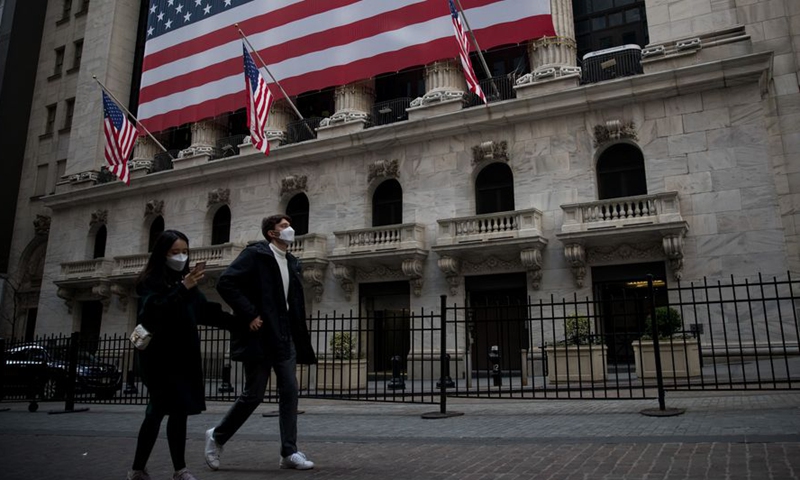Chinese telecom operators’ relisting request a 'touchstone' of Biden’s economic policy
Move seen as 'touchstone’ on Biden’s economic policy toward Beijing

Pedestrians wearing face masks walk past the New York Stock Exchange (NYSE) in New York, the United States, on March 18, 2020.Photo:Xinhua
Three Chinese telecom operators - China Mobile, China Unicom and China Telecom - whose shares have been suspended from the New York Stock Exchange (NYSE) since January 11 following a Trump executive order - demanded on Wednesday (US time) that NYSE review their delisting.
The move came on the first day of US President Joe Biden's term.
Chinese observers said the request could be a "touchstone" of the Biden administration's economic policy toward China, and the chance of the three companies relisting is fairly high, as there is an obvious policy departure for the new US administration.
While Donald Trump abused executive authority to wage an all-out economic war against China - ranging from a trade war to a crackdown on Chinese high-tech companies and financial decoupling - Biden could cite justifications to revoke some of the orders inherited from the previous administration, analysts said, noting that the financial sector may be the first to see a turnaround.
But the new administration is not likely to roll back actions against China's high-tech development, as the key cabinet members nominated for the administration view China as a strategic competitor and they are expected to continue to take a hardline approach, analysts added.
The three companies announced on Thursday that they made written requests on Wednesday (US time) to the NYSE, demanding that a committee under the exchange's board of directors overturn the delisting, and suspend the trading halt before the committee reviews the request.
According to the NYSE's listed company manual, the review shall begin within at least 25 working days following the request being submitted.
In response, China's Foreign Ministry spokesperson Hua Chunying said on Thursday that the three companies have been listed on the NYSE for nearly or over 20 years. They abided by US rules and supervisory requirements, and they have gained wide recognition among global investors.
Trading by the three companies in the US has been halted since January 11, after NYSE made two U-turns on the matter to follow an executive order Trump signed in November that bars Americans from investing in the companies on allegation that they have "Chinese military links."
The move was widely seen as one of Trump's final moves against China during the waning days of his presidency, to further stir tensions between the world's two largest economies and set traps for Joe Biden.
Gao Lingyun, an expert at the Chinese Academy of Social Sciences in Beijing, told the Global Times on Thursday that the timing of the appeal indicated that the three companies had communicated with relevant US regulators beforehand.
"Both sides have a tacit understanding on the issue, and the development is going along openly and in line with relevant laws," Gao said, predicting that the result will be optimistic.
"The Biden administration may find a justifiable reason not to carry out Trump's executive orders rather than directly overturning them, because he still wants to look tough on Chinese issues," Gao added.
Dong Dengxin, director of the Financial Securities Institute at Wuhan University of Science and Technology, told the Global Times on Thursday that how Biden deals with the relisting demand will serve as a barometer of the new administration's overall economic policy on China.
Biden did not mention China in his inaugural speech. But marking a drastic turnaround from Trump's stances, Biden signed an executive order to facilitate the US rejoining the Paris climate agreement, in one of his first acts in the Oval Office. Biden also walked back the former administration's plan to withdraw the US from the World Health Organization.
"Trump was deliberately setting barriers for Biden in his final days, including escalating tensions on China-US relations. Biden is clear-headed and will make restoring order a priority," Dong said.
Dong noted that the financial and capital markets - which involve the interests of Wall Street - could be the first area to see a tone reversal and even a broader scope of cooperation.
In trade and high-technology exchanges, there won't be any immediate policy loosening, and curbs on China could persist for a long time, analyst noted.
In what Chinese observers called the "final frenzy" ahead of the transition, Trump added two Chinese companies - Chinese National Offshore Oil Corp and aviation firm Skyrizon - to a blacklist, in addition to about 300 Chinese firms already on the export blacklist.
He also issued an executive order in January, prohibiting any person subject to US jurisdiction from conducting transactions with eight Chinese apps including Alipay and Tencent QQ. It also revoked the license of companies including Intel that supply materials to Huawei.
During his term, Trump fired a series of shots at Chinese tech companies. He published an executive order targeting short video app TikTok and messaging app WeChat, in addition to putting Huawei on an Entity List.




